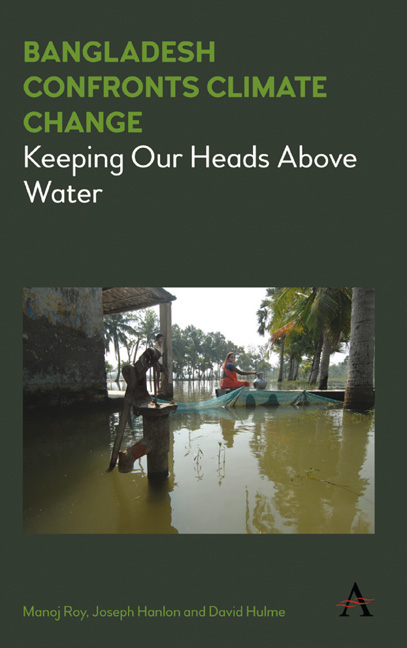Book contents
- Frontmatter
- Content
- List of Illustrations
- Abbreviations, Acronyms and Bangladeshi Terms
- Acknowledgements
- About the Authors
- Chapter One Actors, Not Victims
- Chapter Two How Will Climate Change Hit Bangladesh?
- Chapter Three Taking the Lead in Negotiations – and Moving Forward
- Chapter Four Sea Level Rise and the Vulnerable Coast – Where Farmers Know More than Engineers
- Chapter Five Saving Lives with Cyclone Shelters
- Chapter Six Living with Floods
- Chapter Seven Agronomists Keeping Ahead of Climate Change
- Chapter Eight No Climate Change Migrants – Yet
- Chapter Nine How Can the Privatized Megacity Cope with Climate Change?
- Chapter Ten Is Climate Change Only a Problem for the Urban Poor?
- Chapter Eleven Power – Political, Financial and Electrical
- Chapter Twelve Bangladesh on the Front Line of Climate Change
- Index
Chapter Seven - Agronomists Keeping Ahead of Climate Change
Published online by Cambridge University Press: 22 July 2017
- Frontmatter
- Content
- List of Illustrations
- Abbreviations, Acronyms and Bangladeshi Terms
- Acknowledgements
- About the Authors
- Chapter One Actors, Not Victims
- Chapter Two How Will Climate Change Hit Bangladesh?
- Chapter Three Taking the Lead in Negotiations – and Moving Forward
- Chapter Four Sea Level Rise and the Vulnerable Coast – Where Farmers Know More than Engineers
- Chapter Five Saving Lives with Cyclone Shelters
- Chapter Six Living with Floods
- Chapter Seven Agronomists Keeping Ahead of Climate Change
- Chapter Eight No Climate Change Migrants – Yet
- Chapter Nine How Can the Privatized Megacity Cope with Climate Change?
- Chapter Ten Is Climate Change Only a Problem for the Urban Poor?
- Chapter Eleven Power – Political, Financial and Electrical
- Chapter Twelve Bangladesh on the Front Line of Climate Change
- Index
Summary
Developments by national scientists have made Bangladesh self-sufficient in rice, and ongoing technical advances should keep ahead of climate change, at least until 2050. Two decades ago there were predictions that Bangladesh faced famine; instead there are rice exports and child nutrition has improved dramatically. This is the result of postindependence agricultural and social revolutions, which are also pointing the way to coping with climate change.
Rice is the staple grain and provides 75 per cent of the calories and 66 per cent of the protein of the average daily diet. The huge variations in soil, climate and seasons in the country mean that an estimated 27,000 rice varieties have been developed by farmers over the centuries in Bangladesh. Some can grow 20 cm per day to stay above increasing water depths and can grow above 5 m of water; others are adapted to using the pre-monsoon and monsoon rains. Farmers have seeds for several varieties for different seasons and rainfall patterns. There are three rice seasons (see Table 2.1) identified by the time of harvest – post-monsoon, pre-monsoon and during the monsoon. One has short and long growing varieties, leading to four common rice crops:
• B Aman is broadcast or directly seeded aman, planted in March/ April under dry conditions but at the time of pre-monsoon showers in areas that normally have deep flooding. This is harvested in October/ December.
• T Aman is transplanted aman, planted usually in July/A ugust during the monsoon but where normal flood depth is less than 0.5 m. With a shorter growing time, it is also harvested in November/ December.
• Boro is transplanted and grown under irrigation during the dry season. It is planted from December to March and harvested between April and June.
• Aus is sown during the pre-m onsoon showers in March/A pril and is harvested in the monsoon season in June/ July. Traditionally, it was broadcast sown (B Aus), but increasing amounts are now transplanted (T Aus) under irrigation on land that will not be deeply flooded in the monsoon season. T Aus is now considered as a late boro rice because it uses the same seeds as boro and is initially irrigated.
- Type
- Chapter
- Information
- Bangladesh Confronts Climate ChangeKeeping Our Heads above Water, pp. 89 - 100Publisher: Anthem PressPrint publication year: 2016



